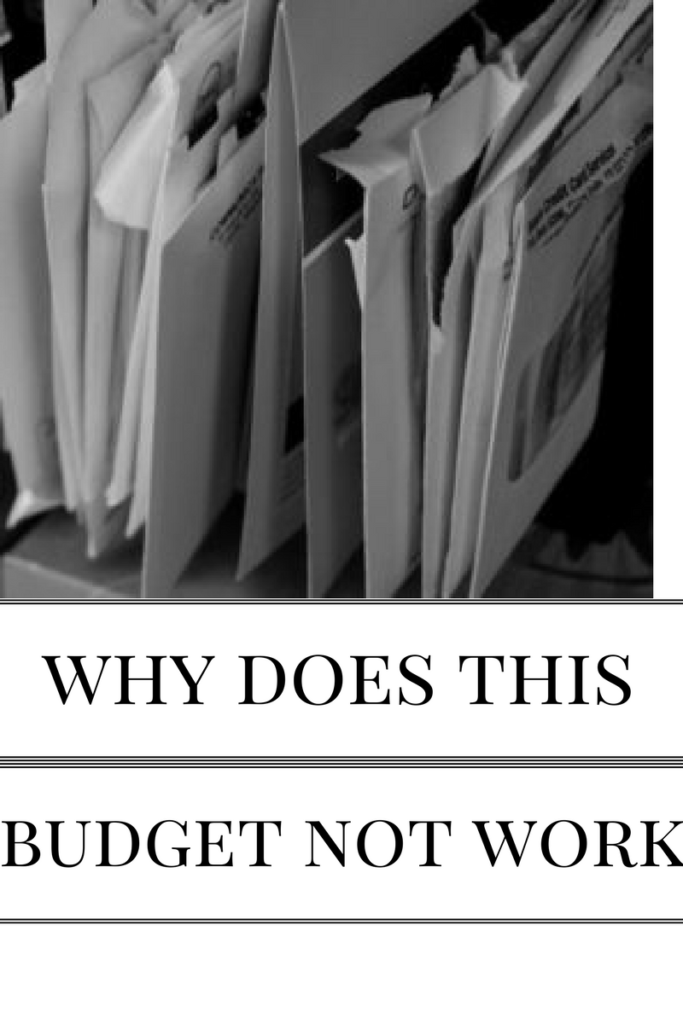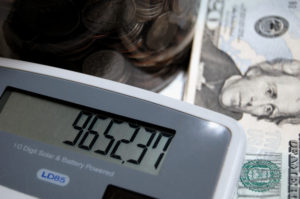Why Is This Budget Not Working
You’ve done all the right things: You have a budget. You track your spending, and you use sinking funds. You save money (maybe). But it isn’t working. Every month you look at your progress, and either you aren’t saving as much as you thought you would, or you are overspending in one or more categories. Why is this budget not working? Here are some things that may improve your budget or budgeting skills.
Why Is This Budget Not Working
Budgets Are A Work In Progress.
Your money is yours. It’s up to you to make it work for you. Of course, what you’ve done (or haven’t done) with your money in the past will influence what you can (presently) do with it. A budget is less a taskmaster than a guide. And budgets evolve. Some financial gurus want you to “name” every dollar. That can be fairly easy to do—if you’ve taken control of your finances and been living on a budget for a while.
There’s a difference between “taken” and “taking.” When you first begin to develop a budget—to take control of your money—there are a lot of variables to deal with, things you can’t control and may not have seen coming. Fluctuation in the price of fuel is a good example of the former. As for the latter, did you have any way of knowing that this winter would be the coldest in the past, who knows how many years (and that the heating bill would go through the roof)?
Establishing appropriate contributions to the various categories in your budget can be challenging. Before it can be done, it’s necessary to spend some time tracking expenditures and spending habits. After they see where their money is going over a period of time (say a month or two), most people know the average amount they spend per pay period on (you name it) and (you name it): The tendency is to think the average spent in any particular category is what needs to be allocated to it.
Once they reach this point, people think they have a budget—nothing changes. The financial aspect of their life is as bleak as ever. They begin to wonder, “Why is this budget not working?” And … they give up. What they don’t realize is that they haven’t developed a budget. All they have is an expenditure list. Along with tracking expenditures, they need to examine their spending habits.
Spending Habits Have Impact.
Brutally track your spending. You should know not only where your money is going but why. Would redistribute some funds have a positive effect on your financial status? What are your spending habits?
Could it be that…
1) You’re Dealing With Debt?
Debt is a real budget killer. If you have borrowed money, funding a category for repayment is the primary obligation (even if it does not receive the largest allocation). For many people, the need to become debt free is their initiative to budget. Paying off debt is extremely important. As soon as the debt is eliminated, the funds allocated to repayment can be redistributed to increase financial security or standard of living.
2) Not Everything’s Been Included?
What recurring needs or events don’t receive dedicated funds? Dates, textbooks, birthdays, holidays… It sounds worse than it is. When you include everything, there’s much less “Robbing Peter to pay Paul.”
3) Expenses Are Underestimated?
Are you overspending? You may need to reevaluate your budget. Are you allowing enough money for each category in your budget? Maybe you have too much money set aside in one category and not enough in another. It’s worth looking into. Even though budgets are not to the penny, you may be able to get closer to your goal by making some changes. Maybe you’ve allowed yourself too much money for certain things and need to be more frugal—make your funds more efficient. Maybe you don’t earn enough money and need to get a part-time job.
4) “No,” Needs To Be Said?
Don’t allow instant gratification to ruin your budget. Sometimes, this is difficult—saying “No,” or “Enough.” If you hit your limit in any category, stop spending from that category (unless it’s a bona fide emergency). There are times when the amount budgeted for something just needs to be enough or even to be cut…
Here’s an example of each:
“Enough.” I give myself an allowance every week. I spend it mostly for coffee on my way to or from work—usually from a gas station, but occasionally from Starbucks. (I really like their coffee.) Anyway, one too many trips to Starbucks, and I’m out of coffee money for the week. When that happens, I don’t put it on a credit card. I don’t borrow from another fund, and I don’t have a slush fund. I go without. That’s the way it has to be if I’m going to make my budget work. (And I know that after payday, I’ll have my coffee money again.)
“Cut Back.” There have been times when I’ve had to suspend my coffee fund for a while. Sometimes, we’ve needed to have a fairly austere budget to make life work. Once, my wife and I gave up the money we allowed for several things we regularly enjoyed and a couple that bordered on necessity. To make a long story short, we’ve usually been a one-car family. Early in 1988 we realized we would need a second car later in the year—but only for a couple of months. We researched renting a vehicle but decided buying one could be more economical. We cut back the funding on quite a few categories, so we could have the money to buy a good previously owned car. It worked out well. We bought a used car and sold it when we were done with it. (I wrote an article using a car checklist.) After we purchased the car, we reworked our budget to include the things we’d needed to cut in order to afford it.
I’ve mentioned “Robbing Peter to pay Paul.” There are times when the unexpected happens. It’s always best to have an emergency fund (more about that shortly), but sometimes the money in a category has to be redirected. There are a lot ways to do this—some are not even very arduous: You’ve been saving for a Florida vacation. The time to leave is getting closer, but your car now needs a major repair. Take a staycation instead of a vacation. (Family membership at the local pool is definitely cheaper than two weeks in a hotel on the beach.). It’s Friday, tonight’s the night you’ve been planning (and saving for six weeks) to take your wife to that hot new restaurant that everyone’s raving about. Dinner for two will cost about $90. This morning your kid reminded you that today was the day he needed to turn in $65 for the class trip. How did I manage to forget about that? (This really happened to me.) So … You have an intimate dinner at home. (I did the shopping, and the cooking, paid my daughter to set a nice table and clean up—and to be at the theater while we dined.) Whew! Disaster averted. You want to buy your teenage son a car. You’ve been putting money away in a dedicated car fund for several years, but you realize you’re going to have to replace your roof. You can’t buy a car and afford a new roof until it dawns on you that your son doesn’t really need a new car. He just needs something to get around in. It may not be a “looker,” but a reliable, older car will cost about half of what you were planning to spend. Getting both the roof and car seems feasible now.
The Answer.
Even though I had to do it from time to time, I never liked to raid one fund to cover expenses in another category—especially when it was a non-emergency. So, I began to use the principle of frugality to guard against that need.
After I know what my average (and probably adjusted) expenditures are and am allocating funds to the various categories in my budget, I try to go a step further: I try to spend less than I’ve allowed myself. (I work at being frugal.) I decided to try to underspend my allotments and save what I could. For example, to save gas I route my errands in a circle rather than crisscrossing town several times.
Saving gas saves money. I often find that come to the end of the week, I haven’t spent the total allotted to my fuel fund. Last week I had $4.00 of gas money left over (what to do with extra money). I’ll leave that in the fund, and my goal will be to add to it, not to spend it. Sometime in the future, if the price of gasoline goes up, I’ll have a cash cushion to ease the way until I can adjust my budget. Sometimes I get quite a buildup in one category or another (like fuel). When I get to the point that the amount feels extravagant, I’ll transfer the majority of the excess to a fund that’s lagging or to my emergency fund. The point is, don’t spend more than you’ve allotted, and don’t spend just because you have it. Save—you’ll need it someday.
The Emergency Account.
So, there I was… sitting along the side of the road with one of my tires blown out. I thought, “This definitely, isn’t in my budget.” (That was the inspiration for starting an emergency account.)
Have you ever considered planning for the unexpected? An emergency account is an important element in your budget. As hard as we try, we can’t budget for everything. We just don’t know what’s coming next. An emergency fund is essential for taking care of all the vague “what ifs.”
Early on, as I began allotting funds to my emergency account, I was raiding it fairly frequently. My sense of what could happen and my budgeting skills have both improved since then. I can’t tell you I never need to access those funds these days, but I don’t get unpleasantly surprised nearly as much as I used to.
There’s no way to know when or what the next emergency is going to be. No way to know how much it will cost. To cover the “what ifs,” contributions should be made to your emergency fund every payday. Experts recommend that an emergency fund hold three to six months of living expenses, but I think the goal should be to build to a year’s worth.
Conclusion
The question was, “Why is this budget not working?” If your budget isn’t working the way you need it to, you may need to reevaluate it. Look at the suggestions in this article. There may be some you’ll want to apply.
I don’t view the allocations in a budget as money free for spending. You may not be able to line up your allocations with your expenses to the penny, but you can get close. Once you’re close, work at being frugal with your funds. Try to find ways to cut costs and save more. I feel successful when I have money left over at the end of the month. Leftover funds can stay in their category, be applied to a category that’s lacking, or be added to an emergency fund. Any of those choices enhance your financial well-being.
A budget is a guide. The more accurately you distribute your funds among your categories, the better use you make of them. You won’t need to ask, “Why is this budget not working?” It will work.




